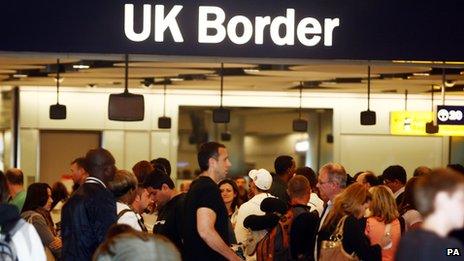Immigration study questions Welsh tradition of welcome
- Published

Research highlights differing views on immigration across Britain
"Wales has a proud history of welcoming migrants into Wales whether they are economic migrants or refugees seeking asylum," <link> <caption>says the Welsh government</caption> <url href="http://wales.gov.uk/topics/housingandcommunity/communitycohesion/migrants/?lang=en" platform="highweb"/> </link> .
But a new study is questioning that that opinion.
Social scientists in Bangor have been crunching numbers - admittedly small numbers - gathered by a series of surveys over a four year span.
And the theme that emerges is that a larger percentage of people in Wales hold negative views on immigration than in Scotland, Northern Ireland or parts of south-east England and London.
In fact, the suggestion in the research by Wiserd - the Wales Insitute of Social and Economic Data and Methods - is that Wales shares similar, and more negative views, with neighbours in the English Midlands and the north of England.

Some areas of Wales have thriving immigrant communities, such as Polish migrants in Wrexham
"There seems to be a trend whereby, on the one hand Wales, the Midlands and northern England report higher support for reducing levels of immigration and relatively more negative views upon the impact of immigration," explained report co-author Dr Robin Mann.
"On the other hand in London, Scotland and indeed Northern Ireland, there seems to be a different pattern, where support for reducing immigration is not so high and where attitudes to the impact of immigration seem a little more favourable."
"It might be a surprise, in that you might expect Wales and Scotland to be quite similar - and of course, what we found was that Wales seems more similar to the majority of England than it does to Scotland."
It is the first time that such data has been forensically analysed in a bid to get a clearer picture of attitudes to immigration in Wales.
The figures have been gleaned from two different surveys, carried out at a European level and in England and Wales between 2008 and 2010.

Cardiff's former Tiger Bay in 1957 - where American gospel singer Sister Rosetta Tharpe entertained children in one of the UK's oldest multicultural areas
Of course, the analysis does come with some major caveats. The main one is the sample sizes used to look for comparisons.
For example, the European Social Survey covers 30 countries - so the data for those questioned in Wales is tiny - about 130 people were quizzed.
But the report authors insist that they are valid measures of attitude, especially as the surveys were repeated at two year intervals.
"While the Welsh sample is small, it does allow comparisons between regions in the UK and elsewhere, as well as over a period of time," they argue.
So what about the differences that the research suggests could exist?
Scrutinsing the European figures, researchers revealed that while 10% of those quizzed in Scotland thought immigrants damaged cultural life, in Wales nearly 25% held that view.
A minority of those quizzed on letting people from poorer countries outside of the EU into Britain took the firm stance that none should be allowed to settle in the UK.
But in Wales, the figure of those backing that view was nearly 19%. However, in Scotland, just under 11% took the hard-line approach.
"The more interesting question is why Scotland seems to report less support for reducing immigration compared to Wales," notes Dr Mann.
"The message from both the Scottish and Welsh governments is very much pro-immigration.
"The Welsh government has done a lot of good and important work at the local level in terms of developing its policies on it migrants forum, and its refugee inclusion strategy.
"But it would seem that the data suggests that people are still somewhat unhappy with the idea of immigration."
However, it is not all grim reading. The negative views uncovered in the study reflect a minority view.
For example, while 21% of those asked in Wales felt immigration had a "very bad" impact on the economy - 35% thought it had a good or very good impact.
And while 24% viewed immigration as very bad for cultural life, 34% believed it enriched society.
The study itself was actually funded by the Welsh government, in the hope it could help steer its own policies on social cohesion and immigration.
So what does it make of the findings?
Perhaps not surprisingly, it notes the limitations of the data, which is carefully documented by the researchers themselves.
"They also highlight the need to be careful in drawing conclusions in the apparent difference between attitudes to immigration across the UK without further analysis," added a government spokesperson.
But the Welsh goverenment remains robust on its stance as far as immigration is concerned
"Wales is a welcoming country, which has been built upon principles of fairness and equality," stated its spokesperson.
"We are committed to supporting organisations working both with migrants and the communities in which they live and work to tackle any underlying tensions and for negative stereotypes and myths to be overcome.
"It is important people feel free to live without experiencing discrimination."
So where does that leave the statement about Wales being welcoming to immigrants? According to both the report authors - and the Welsh government, it is in need of more research.
- Published4 January 2012
- Published24 February 2012
- Published2 February 2012
- Published10 January 2012
- Published20 January 2012